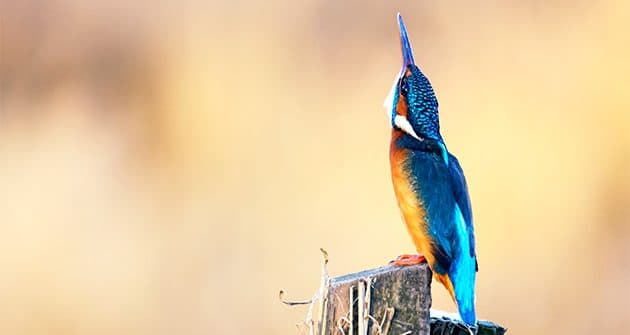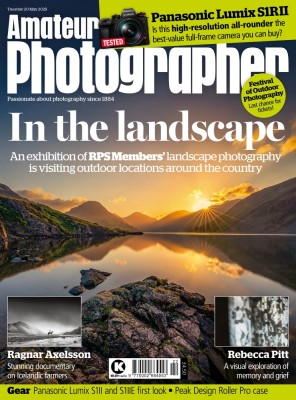Paul Williams, wildlife photographer
On a warm spring day in March 2010 Paul Williams’ life changed forever. As a policeman, ex-soldier, and former mental-health specialist he had witnessed plenty of unsettling events, so when a tall, unkempt woman burst into Bournemouth police station, whipped out a samurai sword, and threatened to kill everyone in the room he reacted swiftly. ‘I diverted her attention from others by shouting at her, trying to make myself the target,’ he recalls. ‘She raised the sword above her head, and I instinctively found my [pepper] spray, dispensing the content into her eyes.’ The woman (who was suffering from schizophrenia) dropped the weapon, ‘screaming and clawing at her face’ as the spray took effect. She was arrested (and later sectioned under the Mental Health Act), while Paul was left to complete a mountain of paperwork, and get on with his job. Three months later, on the eve of his 50th birthday, this stoic man was lying on a hospital bed with a wall of machines monitoring his vital signs. Paul believed he was having a heart attack, but the health professionals disagreed with his self-diagnosis. Having seen his GP, he was signed off work with stress-related symptoms. It was the beginning of a ‘living hell’.
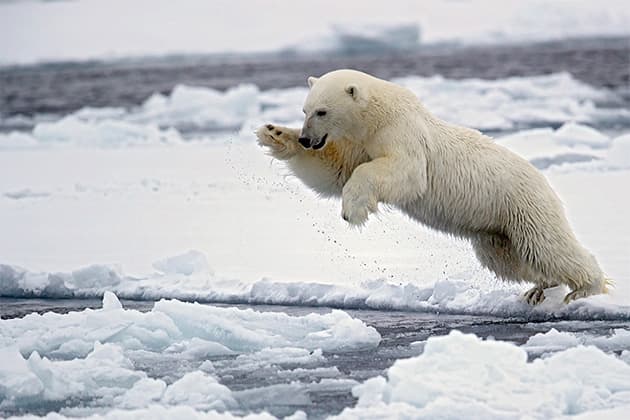
A leaping polar bear. Canon EOS-1D X Mark II, 600mm lens, 1/640sec at f/5.6, ISO 800. Credit: Paul Williams
Getting out of the abyss
In the months that followed, Paul’s mental health deteriorated and a diagnosis of Post-Traumatic Stress Disorder (PTSD) and severe recurrent depression was made. But Paul wasn’t ready to accept this label, and his denial plunged him deeper into the abyss. By 2011 he had hit rock bottom, and attempted suicide three times. Despite the bleakness of his situation, some of the dark, angst-filled days were punctuated with flashes of light and hope. ‘I discovered I had a lot of birdlife and a family of mice and voles living outside my kitchen window,’ he reveals. Paul began looking forward to the arrival of these opportunistic creatures, and decided to dig out his camera and record their comings and goings. ‘I got a lot of pleasure out of the fact that the shots weren’t easy to get,’ he admits. ‘I don’t believe wildlife should always be easy to photograph – I think you should have to work for it.’ With some trepidation, Paul posted a few images on Facebook, and received a favourable response, which boosted his self-esteem. Before long this soft-housebound man was in the garden searching for subjects to photograph.
Not exactly a newcomer to the scene, Paul’s background in photography dates back to the 1980s when he had a penchant for landscapes. When he picked up the camera again it was macro and wildlife that offered the greatest distraction from the symptoms of his PTSD.
‘When you’re out shooting insects you’re concentrating, and for 10 or 15 minutes whatever was troubling you just disappears into the background because you’re so focused,’ he suggests. ‘It was also good for me physically as it got me moving my body outside in the fresh air and sunshine rather than being cooped up in my house.’
In terms of recovery, it was still early days, but the relationship Paul was fostering with his local wildlife was providing both comfort and a striking collection of images. ‘There’s something unique about having a small insight into the life of a wild animal,’ he enthuses. ‘It’s a privilege to experience.’ In time he found the strength to widen his search beyond the back garden, and began actively looking for wild subjects. The way forward was becoming clearer.
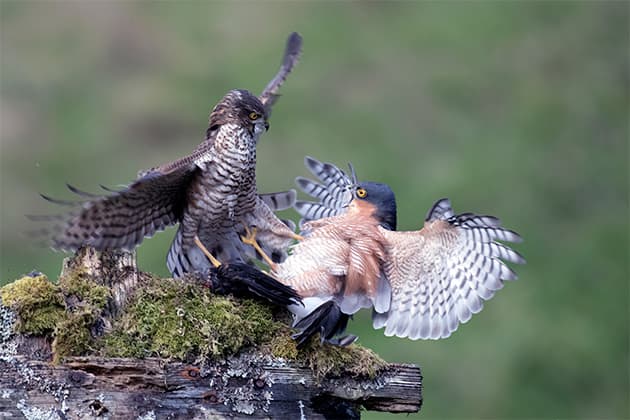
Two sparrowhawks fighting. Canon EOS-1D X Mark II, 100-400mm lens, 1/800sec at f/5.6, ISO 1000. Credit: Paul Williams
Celebratory images
One of Paul’s excursions led him to Brownsea Island, not far from his Dorset home. Here he encountered red squirrels, peacocks and sika deer. Taking the short boat trip to the island meant that he could leave his troubles on the mainland. As wildlife became his lifeline, Paul began to realise that many species in the UK are critically endangered. ‘Wildlife is struggling on a global scale,’ he warns. ‘It feels important to document these animals to raise awareness and to make people realise that we are impacting on them on a daily basis.’
Some photographers inspire action by showing us images of wildlife in distress: birds feeding plastic to their young, orphaned rhino calves or marine life entangled in discarded nets, for example, but Paul’s images are celebratory. ‘I think there’s a danger of us becoming oversaturated with negative messages, which might lead people to think that there is no point in planting flowers for bees, or saving something, because the planet is messed up anyway,’ he warns. ‘So one of the messages I’m trying to get out is that this stuff is worth saving, it’s important, and it’s not too late – everybody can make a difference.’
Alongside this call to action, Paul uses his images to share some of the privileged encounters he has with wildlife. ‘Less than three years ago the main thought I had each morning was is this the day I’m going to kill myself,’ he confides. ‘One of the ways I help my mental health is by sharing pictures that I’ve taken with people who might not otherwise get the chance to see these things.’ It’s no wonder that giving something back makes Paul feel better; contribution is considered by many as essential to wellbeing, whether or not you su er from a mental or physical health condition.
‘I’m a strong believer in putting back in and not just taking out of the system,’ echoes Paul. As a result, he works closely with Dorset Wildlife Trust (DWT). ‘It’s a great partnership. DWT has been very good to me, and I like to reciprocate – they’ve got most of my portfolio to use as they wish.’ Paul also contributes via his workshops, which he gets a lot out of.
Paul’s military career might have played a part in the decline of his mental health, but it had a few unexpected benefits too, in terms of fostering willpower and discipline and a great emphasis on fitness.
Having faced some seriously bleak times, Paul has a level of self-awareness that’s refreshing to encounter. ‘I’m no longer lost in a forest, but I’m not out of the woods, and probably never will be,’ he admits. ‘It takes a lot of effort, but you’ve got to keep sight of the fact that, irrespective of your problems, there is a way to re-channel your energies and move forwards. You’re on a journey, and that’s crucial.’
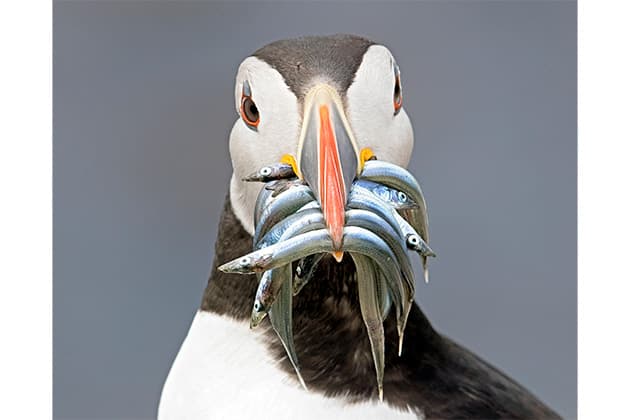
A great close-up of a puffin with lunch. Canon EOS-1D X Mark III, 500mm lens, 1/320sec at f/14, ISO 620. Credit: Paul Williams
What helped
Paul’s practical tips to help cope with tough times
- Setting achievable goals ‘I started taking pictures of the animals in my garden from my kitchen window. If you have a garden, start there.’
- Macro photography ‘Taking pictures of snails and insects gave me time out from the almost incessant chatter going on in my head. To get the shots right, at least to my satisfaction, I had to be fully present in the moment.’
- Keeping fit ‘Aside from the obvious benefits to my health, keeping fit means I can tolerate extremes of weather and tiredness too.’
- Being mindful ‘Let go of what has gone before, and live in the here and now. Make the most of the day you’re in, and try not to worry about tomorrow, because our tomorrows are not shaped. Today we can do something with.’
- Getting outdoors ‘As a species, we need to reconnect with what’s going on outdoors. After a couple of days I can feel myself needing a hit.’
- Making a contribution ‘The early links I made with Dorset Wildlife Trust (DWT) resulted in me facilitating photography workshops on Brownsea Island. I also created all the images for its 2019 calendar.’
- Connecting with wildlife ‘Looking for wildlife, trying to be stealthy and seeing animals before they see me, became part of my therapy.’
- Keeping playback to a minimum ‘Don’t look at the back of your camera for 10 minutes assessing what you may or may not have got. If the exposure is right and the shutter speed is right you know it’s on the camera – concentrate on being in the moment instead.’
- Switching to mirrorless ‘I recently went from a Canon DSLR to a Sony A7R IV mirrorless camera. The resolution, the speed of the autofocus and the lack of sound means I have no regrets. Now I can sit in a hide and be totally quiet.’
- Finding a new purpose ‘When you lose a role, an identity, your self-esteem and self-confidence disappears too. Photography gave me those things back. I can’t recommend it highly enough for people trying to heal their mental and physical wounds.’
Paul Williams rediscovered his love for photography after being diagnosed with PTSD and depression. Since then his work has been widely published as well as being shortlisted in major competitions. His book, Wildlife Photography: Saving My Life One Frame At A Time, was published in 2019.
Matt Doogue, macro photographer
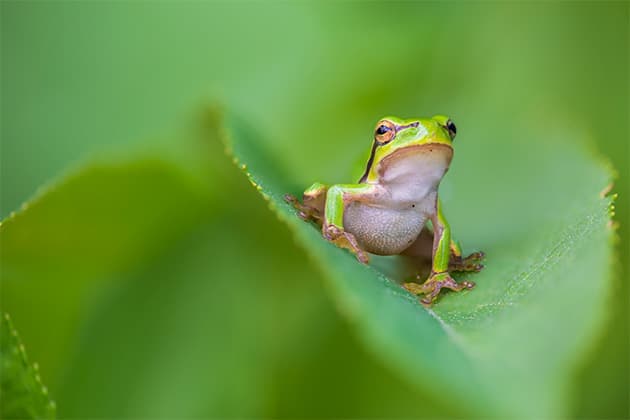
A charming close-up of a frog, with great bokeh. Canon EOS 6D, 180mm lens, 1/320sec at f/2.8, ISO 800. Credit: Matt Doogue
In 2018 a number of schools in London were closed due to ‘infestations’ of false widow spiders. These arthropods have bulbous bodies with striking markings and are often mistaken for the more dangerous black widow spider. In truth, false widows can deliver a relatively painful bite, but surely closing schools and fumigating buildings sends the wrong message out to a generation already experiencing a serious disconnect with nature. According to a report by the Natural History Museum (NHM), ‘When young people are connected to nature, it has positive impacts on their education, physical health, emotional wellbeing and personal and social skills.’ What’s more, when we encourage children to enjoy the natural world they are more likely to take an active role in protecting it.
Reconnecting children with nature is something that photographer Matt Doogue feels very passionate about. In recent years he has hosted classroom sessions in primary schools all over Scotland, armed with creepy crawlies (including spiders) and a desire to showcase the beauty of the natural world, while also sparking a passion for conservation.
‘To begin with most of the kids are scared and they don’t want to touch anything,’ he admits. ‘I explain to them that their fear is inherited – it’s come from the media, films, parents – in reality there’s no reason to be scared.’ By the end of the session these same children are queuing up to hold a praying mantis or a spider. ‘Even if I only change one child’s mind it’s worth it,’ says Matt. Having imparted his wisdom, he packs up his gear and heads o to begin an eight-hour shift at work. ‘I feel great, because I’ve met all these kids and I’ve had a sort of pat on the back,’ he laughs. ‘We don’t pat ourselves on the back enough.’
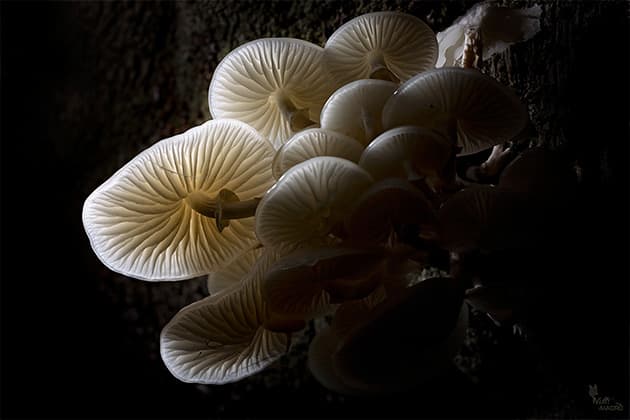
Beautifully lit fungi. Canon EOS 6D, 180mm lens, 1/160sec at f/2.8, ISO 50. Credit: Matt Doogue
Keeping the mind busy
But Matt hasn’t always felt this positive. In 2011 he was diagnosed with depression, anxiety disorder, acute paranoia and anger issues, although there were signs of trouble earlier than this. At times the despair was so great that he contemplated suicide. After a trip to the doctor, a prescription for anti-depressants and some counselling, Matt decided he needed something to preoccupy his mind. ‘My wife’s uncle and I would go on walks, and I felt great when I came home,’ he says. ‘He was a photographer – mainly shooting birds and landscapes – and I was fascinated by what he showed me on the back of the camera. I’d never really thought about pursuing photography before, but he lent me one of his old cameras and I decided to give it a bash.’
Matt had been interested in nature since he was a child, but growing up in Salford ‘that stu wasn’t considered cool’, so he had put his passion to one side.
To begin with he tried multiple genres. ‘I shot portraits, glamour, fashion and landscapes, but I kept coming back to macro,’ he explains. ‘You’re basically transported from this world into the world of the arthropods, through the lens.’ Sitting quietly and watching a spider spinning its web or a praying mantis cleaning itself gave Matt a break from his problems. ‘While you’re watching you’re not worried about the world, social media comparisons, or the pressure to live or act in a certain way,’ he suggests.
Matt focuses on wildlife, shooting everything from butterflies to grasshoppers, and he’s quick to point out that being outdoors offers another welcome boost to mental health and wellbeing. ‘Being in the woods, the parks, or by the lochs you disconnect completely and reconnect with nature.
Beating negative self-talk
Matt’s interest in photography gave him the impetus to leave the house, and establish new relationships. At the same time Matt was posting images online, potentially opening himself up to criticism. While many of the comments were positive, some were not. ‘It taught me self-resilience,’ he laughs. ‘I made mistakes and I learnt from them.’ Matt admits he is his own worst critic and often compares his work to that of other photographers. Thankfully, he has a clever way of minimising any negative self-talk. ‘I keep experimenting,’ he explains, ‘that way I’m always pushing myself, and it stops me from being over-critical of my work.’
There’s compelling evidence to suggest that we all need a creative outlet. But those facing challenges with their mental health seem to feel this more acutely. ‘I think a lot of the reasons people struggle with their mental wellbeing is because they have this creativity and they don’t know what to do with it,’ says Matt. ‘You need to put your energy and what you’re feeling into something. When you find a creative outlet you can explore your emotions, feelings and thoughts, and actually do something with them.’ For Matt, this exploration comes in the form of macro photography – a passion that shows no sign of abating. ‘I didn’t set out for photography to be my cure,’ he admits. ‘It just happened. It works for me, and I guess we tend to stick with what works.’
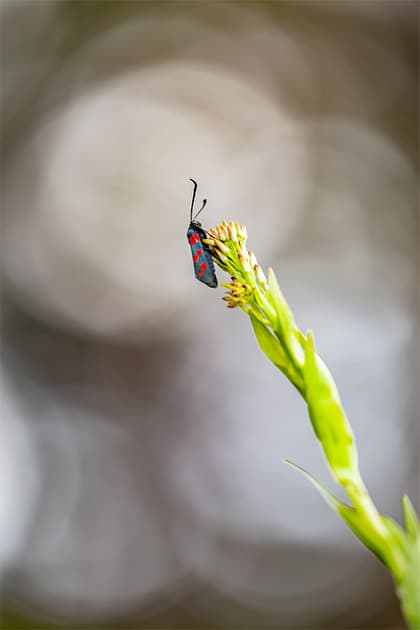
Another of Matt’s exquisite close-ups with spectacular bokeh. Canon EOS 6D, 180mm lens, 1/250sec at f/2.8, ISO 320. Credit: Matt Doogue
What helped
Matt received help from various quarters and found these strategies worked
- Constant experimentation To avoid becoming overly self-critical Matt tries to experiment with different approaches to macro photography – his Belle Âme series is a case in point.
- Joining online forums When Matt didn’t feel able to socialise, he connected with fellow photographers via online forums. ‘It allowed me to speak with people without actually meeting them.’
- Finding a way to contribute Matt regularly visits schools, sharing his passion for wildlife and the environment via his macro classroom sessions. Later this year he will also be embarking on a series of BioBlitzes in school grounds.
- Gaining some perspective ‘If you’re having a bad day it’s just a bad day, not a bad rest of your life,’ assures Matt. ‘You can’t always change what’s going on around you, but you can change how you react.’
- Being outdoors Reconnecting with nature is a natural human instinct and has been shown to lower blood pressure, slow down heart rate, and generally lower stress levels.
- Awarding himself a pat on the back We are so used to negative self-talk that we often forget to congratulate ourselves for what we have already achieved. The size of the achievement doesn’t matter; the way we talk to ourselves does.
- Getting out in the garden ‘You can find nature on your doorstep,’ suggests Matt. ‘Even if you’ve just got a yard you can go outside, turn a stone over and you will find a spider or a woodlouse.’
- Reviewing his back catalogue When I’m feeling rubbish one of my coping mechanisms is to look at the work I’ve created and acknowledge how far I’ve come,’ says Matt. ‘I will have a little cry and then I will be fine.’
- Finding a creative outlet ‘When you have a creative outlet you learn so much about yourself,’ says Matt. ‘Your moods, emotions, how you are as a person and how you interpret the world we live in.’
Award-winning macro photographer Matt Doogue has appeared on BBC’s Autumnwatch, and his work published in most of the UK’s leading photographic titles. In his spare time Matt regularly visits schools to educate children of all ages on the importance of our natural world.
Getting help
BACP www.bacp.co.uk
Inspire www.inspirewellbeing.org (Ireland)
Mind www.mind.org.uk, 0300 123 3393
Rethink www.rethink.org
The Samaritans www.samaritans.org, 116 123
SAMH www.samh.org.uk (Scotland)
SANE www.sane.org.uk, 0300 304 7000

